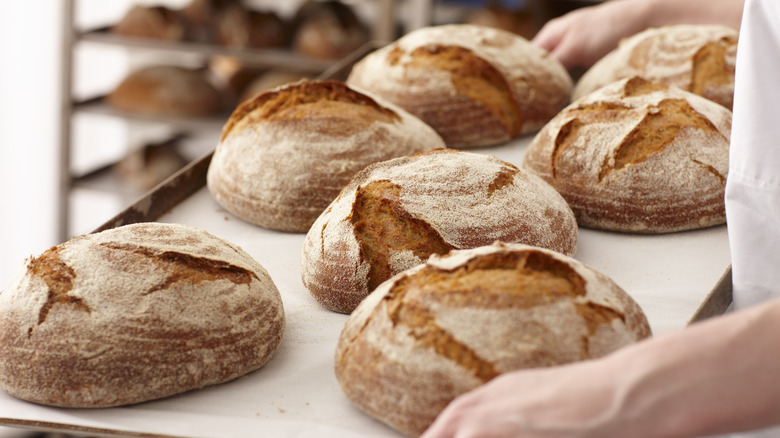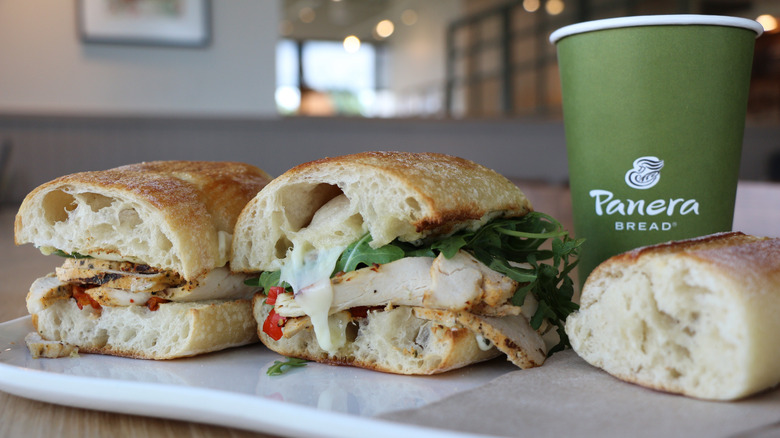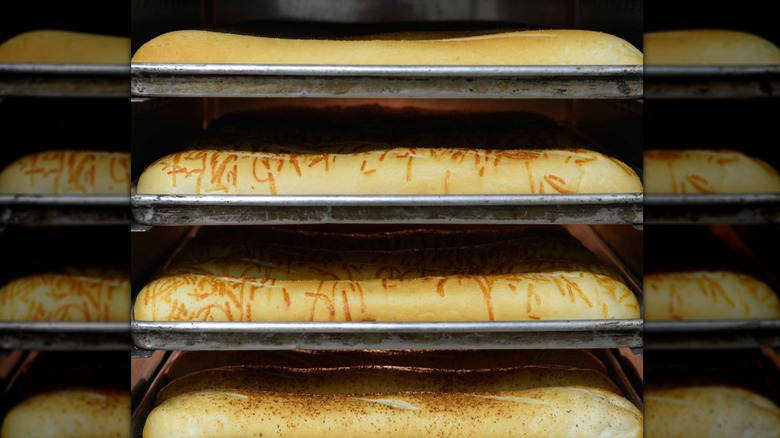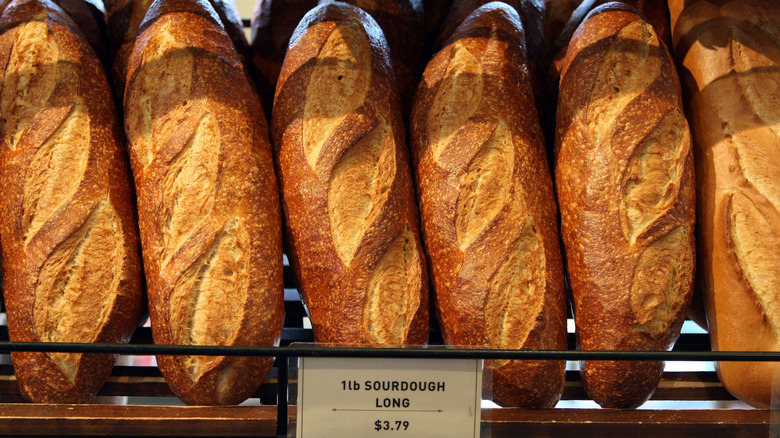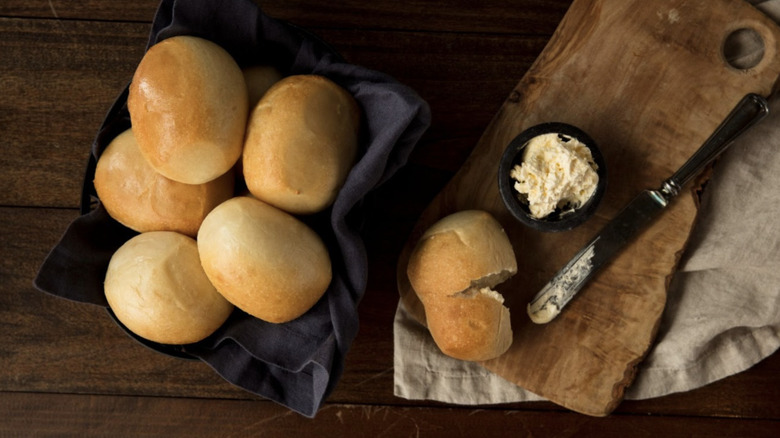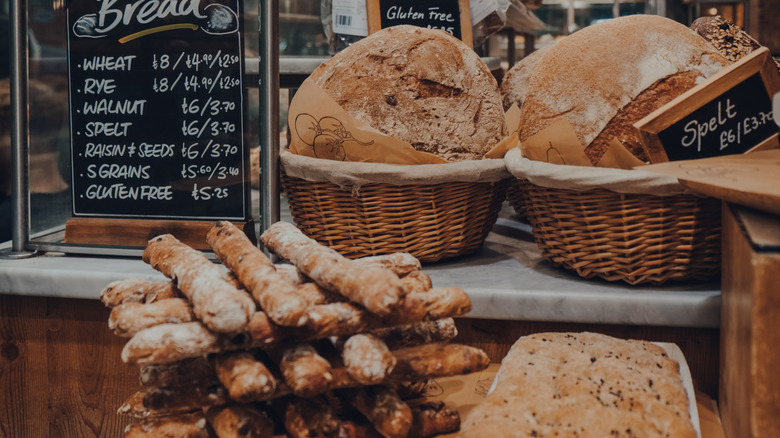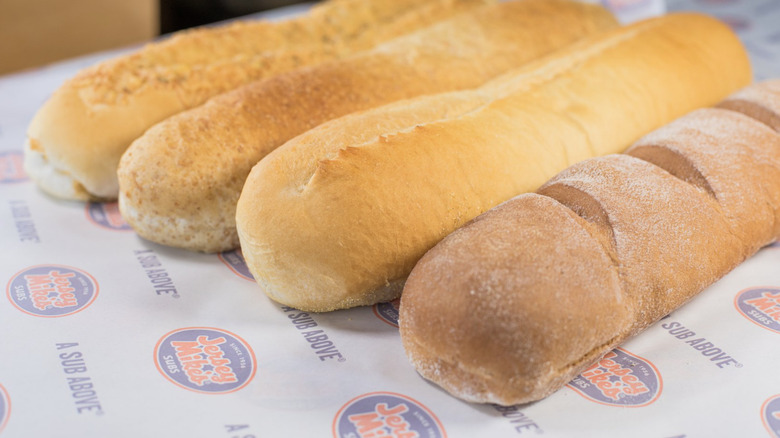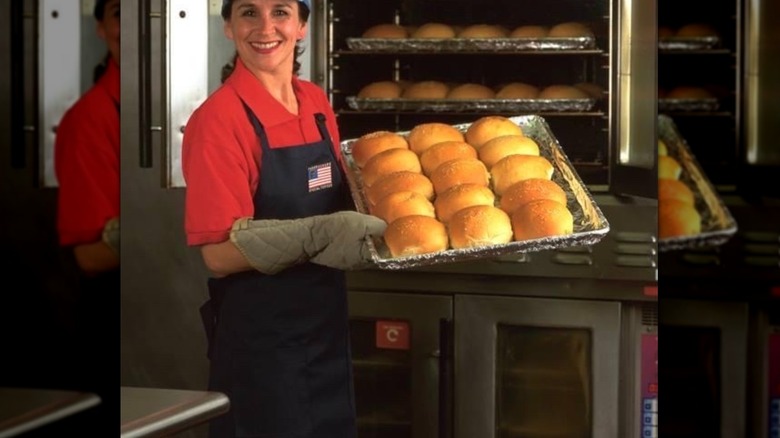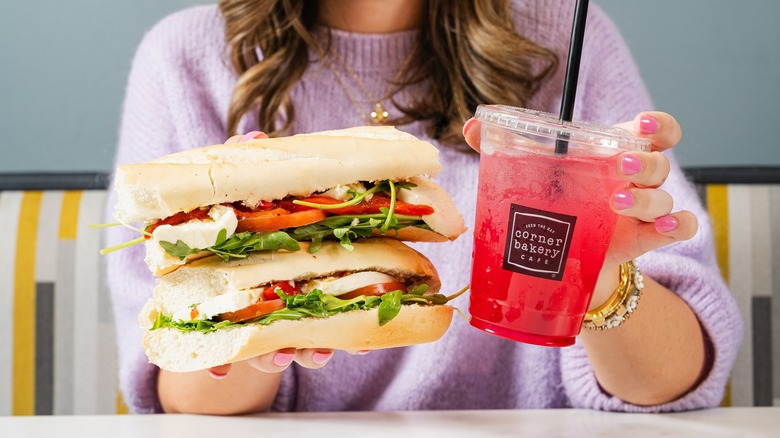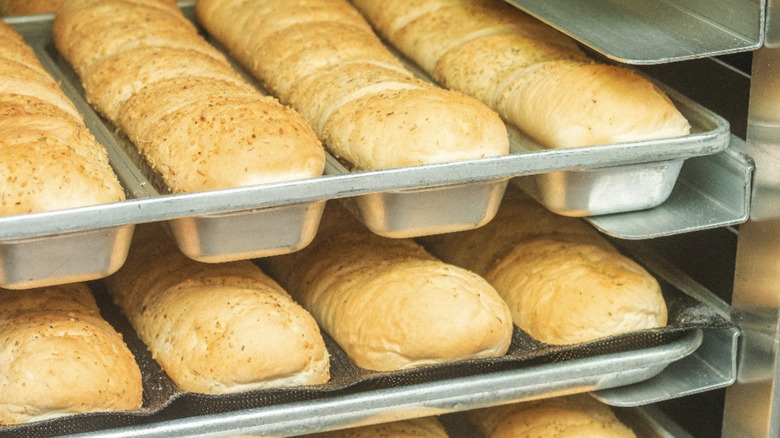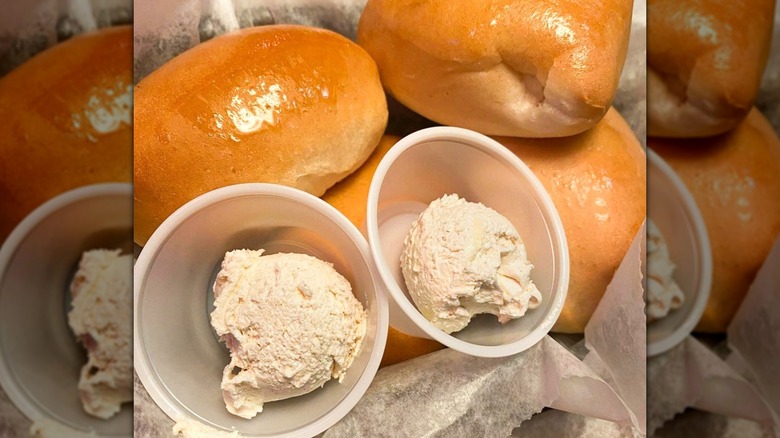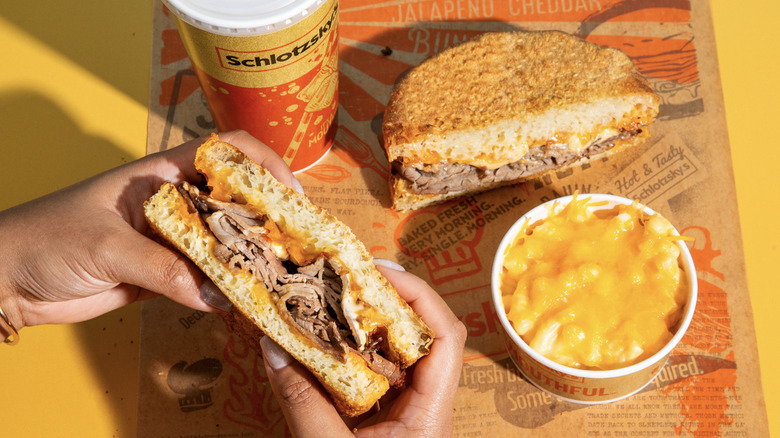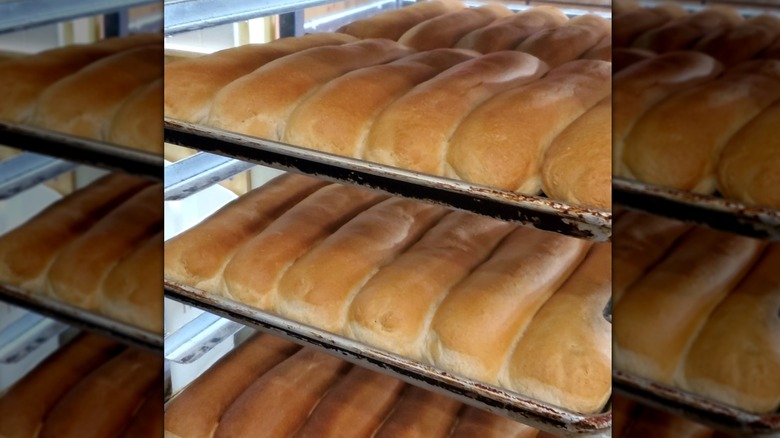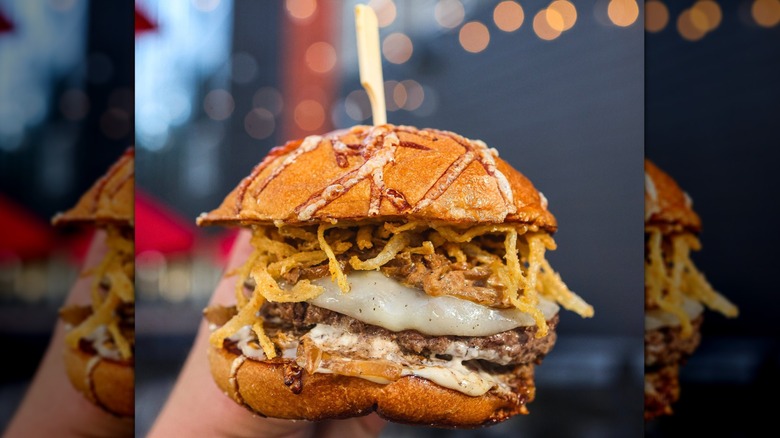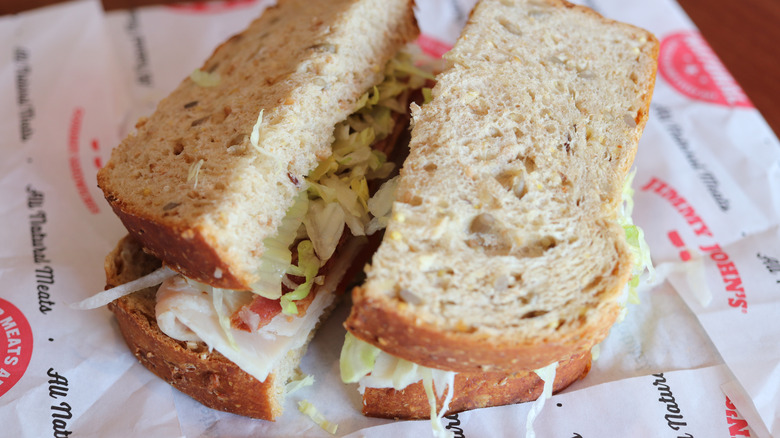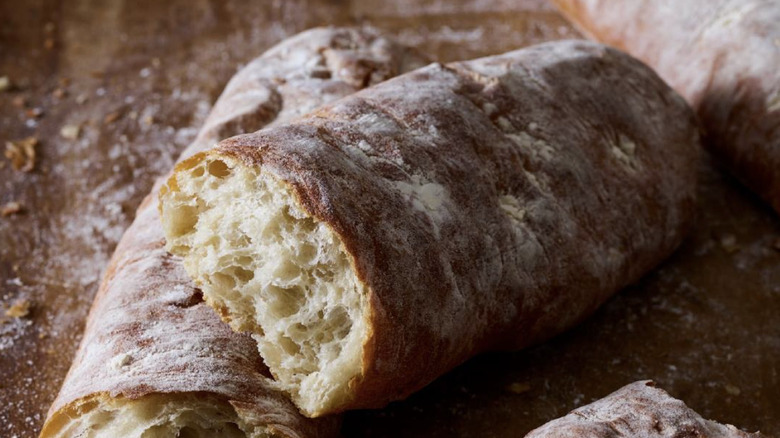Restaurant Chains That Bake Their Own Bread
Few things rival the delectable aroma and taste of warm, freshly baked bread. Crispy on the outside and fluffy on the inside, bread is a simple staple that often transcends culinary preferences. In addition, bread's versatility makes it an ideal ingredient in a range of culinary creations. At its simplest, bread can be enjoyed with a pat of butter or with a little marmalade. It can also be used as a foundation for a range of condiments, from tomato, lettuce, and cheese to beef patties and chicken fillets. Beyond handhelds, freshly baked bread also pairs well with soups, salads, and pastas.
In order to streamline their operations, many chain restaurants don't bake their bread in-house, instead opting to source it from commercial bakeries. This, however, isn't always the case, with some restaurants setting themselves apart by offering their own bread. While some of these establishments make their bread from scratch, others use exclusively prepared premade dough that is frozen before they turn it into piping hot bread on the premises. Keep reading to learn which restaurant chains bake their own bread.
Panera Bread
The roots of Panera Bread go back to 1987 and the foundation of the St. Louis Bread Company, which became known for its sourdough bread. While the St. Louis Bread Company is still in existence, some of its locations have been rebranded as Panera Bread. No matter the name, both ventures have made their mark by serving fresh and delicious baked goods.
Today, Panera Bread still uses the same sourdough starter the St. Louis Bread Company started relying on decades ago. The chain bakes its bread daily, to ensure that its customers get the freshest, highest quality sandwiches and bread bowls with every order. That said, it seems that the chain doesn't exactly make its bread in-house from scratch. Instead, it receives pre-prepared dough and bakes it on-site, as reported by a former Panera manager on Reddit.
Those who like variety will be pleased to know that Panera Bread's sandwiches can be made with a range of bread types, including country rustic sourdough, artisan ciabatta, black pepper focaccia, and French baguette. The chain also offers a range of bagels, including cinnamon crunch, sesame, blueberry, and multigrain.
Cousins Subs
Cousins Subs has been using the same recipe to prepare its dough since first opening its doors in 1972. Despite its growth to close to 100 locations in Wisconsin and two in Indiana, the chain has remained true to its philosophy. Christine Specht, the company's CEO, has described the restaurant's ethos in an interview with the Green Bay Press Gazette, saying, "Some competitors sell fast service. We sell this idea that it is an authentic East Coast-style sub sandwich... raised in Wisconsin [...] Bread is the hallmark of our brand."
To ensure freshness, Cousins Subs proofs and bakes its bread at each location daily, paying special attention to temperature and humidity levels. However, the outlets don't prepare the bread from raw ingredients on-site — the dough is kneaded and formed into logs off-premises and delivered to each restaurant frozen. Cousins Subs serves four different bread types — Italian, multi-grain, Parmesan Asiago, and garlic herb. The chain's customers can choose their bread, and load it with toppings like lettuce, tomatoes, cheese, bacon, and pickles. Alternatively, diners can opt for one of the restaurant's set menu sandwiches such as cheese steak, Philly, or meatball and provolone.
Boudin Bakery
Boudin Bakery's sourdough doesn't contain commercial yeast. Instead, the chain relies on its mother dough, or original sourdough starter with wild yeast and lactobacillus as a fermentation agent. Used by the bakery since 1849, each of the restaurant's sourdough loaves contains a tiny portion of the original mother dough starter. The entire bread preparation process takes up to 72 hours. In fact, visitors to the Boudin Bakery cafe's flagship location at the San Francisco wharf can still see the bakers at work via a 30-foot viewing window and contact them directly through an intercom system.
While Boudin Bakery's claim to fame has been its sourdough, today, the chain serves a range of freshly-baked goods at its 26 locations, including rustic, savory, and sweet. The bread is used in a variety of the cafe's sandwiches, including melts, grilled options, and vegan selections designed to cater to different tastes and dietary preferences. The chain also serves its soups — including clam chowder, butternut squash, rustic tomato, and beef chili — in classic sourdough bread bowls.
Logan's Roadhouse
Logan's Roadhouse employees stand behind their yeast rolls, proudly proclaiming, "Let's be honest — when these freshly-baked, made-from-scratch rolls hit the table, sharing is hard." The chain's delicious, and highly popular, yeast rolls are brought to the table, alongside a generous dollop of whipped butter, to whet the appetite once diners are seated. Alternatively, the rolls can also be purchased by the dozen and half-dozen to enjoy at home.
Diners seem to agree that the yeast rolls at Logan's Roadhouse are show-stoppers, even sometimes stealing the spotlight from the entrees. A case in point is one satisfied customer, who says, "Hot fresh rolls, amazing steak and baked potato. [...] Took a little long to get our food but with the free rolls, we were good to go!" Another patron agrees, saying, "My husband lets me have the last roll because he knows I go for the bread!" Several other diners have also praised the menu item, describing it as excellent, hot and wonderful, and fabulous.
Le Pain Quotidien
Translating to "the daily bread" in French, Le Pain Quotidien was established in Brussels in 1990. The cafe's founder, Alain Coumont, wasn't a stranger to baking, having watched his aunt prepare dough for bread as a young boy. As a freshly baked chef in Brussels, Coumont wasn't impressed with the quality of bread available in the city, so he decided to start making his own organic sourdough with three simple ingredients — flour, water, and salt. Today, Le Pain Quotidien offers rustic bread at over 260 cafe locations in more than 20 countries, including in the U.S.
Le Pain Quotidien believes that all good things take time. Each of the chain's organic sourdough loaves takes more than 32 hours to prepare. Aside from baked goods such as French rolls, baguettes, and ciabatta rolls, Le Pain Quotidien has also recently started baking sourdough flatbread, which can be paired with an assortment of delicacies like mozzarella di Bufala, roasted butternut squash, broccoli, and portobello mushrooms. The flatbread is currently a seasonal offerings, so it remains to be seen if it earns a spot on the restaurant's permanent menu.
Jersey Mike's
The first Jersey Mike's, originally named Mike's Subs, opened in 1956 along the boardwalk in Point Pleasant, New Jersey. The restaurant was one of the first in the U.S. to offer submarine-style sandwiches, or long bread rolls filled with a variety of meats, cheeses, vegetables, and condiments. In 1975, Mike's Subs was purchased by one of its employees — a 17-year-old named Peter Cancro. With a passion for business and quality produce, Cancro renamed the shop Jersey Mike's and began franchising in 1987, eventually expanding the brand to more than 2,800 locations.
Jersey Mike's prides itself on using fresh ingredients, including fresh bread. Baked daily at each location, it serves as an ideal base for the chain's customizable subs. The "authentic Jersey bread" at Jersey Mike's is available in two styles: traditional white and whole wheat. Whether it's a "fresh sliced cold sub" or a "fresh grilled hot sub," all offerings at Jersey Mike's also come with locally-sourced veggies, whenever possible, the tastiest cuts of meat, and the finest cheeses.
Fuddruckers
Billing itself as the home of the "world's greatest hamburgers," Fuddruckers gets its name from an imaginary airline, Fudpucker World Airlines. While the name may be satirical, the chain takes its menu offerings very seriously. Fuddruckers makes its burgers with 100% USDA American premium-cut beef, which it grills to order, and freshly-baked buns. In fact, the chain makes its bread from scratch in its kitchens not once a day, but all day long.
Fuddruckers prepares its bread with a combination of a few simple ingredients, including flour, eggs, yeast, shortening, sugar, and salt. The components are mixed and kneaded for precisely 12 minutes. The dough is then rolled out and fashioned into perfectly-formed balls before being proofed for an hour and 10 minutes. The bread is baked in the oven at 425 F for 12 minutes to achieve a golden-brown exterior and a fluffy interior. Finally, each bun is cut in half, grilled, and filled with your favorite toppings.
Corner Bakery Cafe
The Corner Bakery hasn't done exceptionally well over the past decade, decreasing the number of its locations from just over 180 in 2014 to around 100 in 2024. This decline reflects the challenges of the competitive casual dining sector and the setbacks caused by COVID-19 — both of which contributed to the Corner Bakery declaring bankruptcy in 2023. Nevertheless, the chain appears to be back on track after its acquisition by SSCP, which aims to revitalize the brand. And while the Corner Bakery Cafe may not be as popular as it once was, the restaurant remains committed to serving freshly prepared sandwiches, paninis, salads, pastas, and soups.
Just as its name suggests, the bread and butter of the Corner Bakery Cafe has always been — well — its bread. Right from the get-go, when the bakery first opened in downtown Chicago, its specialty was artisan loaves and baked sweets. No doubt attracted by the aroma of fresh bread, it didn't take much time for the neighbors to start requesting that the bakery fill them with toppings. While we can't be sure how many different types of bread the Corner Bakery Cafe offers today, in 2000, before the pandemic disrupted its operations, the chain produced over 30 varieties of bread.
Subway
The most popular sandwich chain in the world, Subway is the second largest fast food chain globally, after McDonald's. In fact, the restaurant boasts over 37,000 locations in nearly 100 countries. So how has this casual dining giant become so popular? Right from day one, when it opened in Bridgeport, Connecticut, in 1965, Subway offered affordable and customizable sandwich options. Additionally, the restaurant's branding has emphasized healthy menu choices and a diverse range of options that cater to various dietary preferences.
Today, Subway bakes its bread in-house, although the dough is prepared and frozen at external facilities before being shipped to the individual restaurants. Despite its health-oriented branding, Subway's bread has faced its fair share of controversy. In 2014, the chain was forced to change its bread recipe after a blogger took issue with its composition. More specifically, they highlighted that the menu item contained azodicarbonamide, a chemical used in rubber products such as yoga mats.
While it certainly looks the part, Subway's bread has been classified as "confectionery" in a 2020 ruling by the Supreme Court of Ireland due to its high sugar content. According to the country's tax legislation, to be classified as bread, the sugar content in a food item can't go over 2% of the weight of the flour. When it comes to Subway's bread, this figure stands at 10%.
Texas Roadhouse
While Texas Roadhouse is best known for its steaks, there is another menu item that has captured the hearts and stomachs of diners — the legendary rolls. And there is a great reason why these fluffy bites are so popular. The delicious rolls are prepared from scratch and baked fresh every five minutes in-house. Plus, they are served with the chain's proprietary whipped honey cinnamon butter. These pillowy morsels of goodness are complimentary for diners but can also be ordered online as an additional side in dozen and half-dozen batches.
While the rolls at Texas Roadhouse are undeniably delicious, many have found them tricky to replicate at home. According to one Reddit user, this is because Texas Roadhouse makes the rolls by combining a "dry ingredient dough base" with yeast, water, and sugar. "Even the employees have said that they cannot replicate it at home. I have a friend that worked there and told me that a few years ago," they add. This isn't surprising, as the chain conducted extensive trials with various flours and yeasts to give the rolls their signature savory-sweet flavor before settling on the final recipe.
Interestingly, Texas Roadhouse recently came under fire for allegedly downsizing its beloved rolls. However, after further investigation, it turned out that the problem lay with human error at one of the chain's locations. Thankfully, we can all breathe a sigh of relief knowing that Texas Roadhouse didn't shrink its rolls after all.
Schlotzsky's
When it comes to bread, not a lot has changed since Schlotzsky's first opened its doors over five decades ago in Austin, Texas. Bobby Nelson, general manager at the Schlotzsky's in Scottsdale, recently told the Arizona Foodie Magazine that the chain still makes its bread from scratch and bakes it fresh every morning to get ready for the day. "That's basically the way they used to do it in 1971, and they had one sandwich that was called 'The Original,' and their baker would come in the morning, and he would bake off whatever numbers they thought they were going to do for the day, and when they ran out, they closed their doors," Nelson explained.
While The Original, served between two slices of a sourdough bun, still appears on the chain's menu, Schlotzsky's has expanded to more than 330 locations across the U.S. The restaurant's menu is also much larger than it was when it first opened so many years ago, with almost 20 different sandwich offerings, from Roasted Beef & Cheese to Smoked Turkey Avocado. And while most of these handhelds are nestled between two slices of sourdough bread, Schlotzsky's also offers freshly baked rye bread.
Planet Sub
Planet Sub started out as the Yello Sub sandwich shop, which opened in 1979 in Lawrence, Kansas. Building on the popularity of the original restaurant, Sean and Jeff opened the flagship Planet Sub in 1998. Today, Planet Sub has 33 outlets, with the majority of the restaurants located in Missouri and Kansas.
True to its name, Planet Sub specializes in sub sandwiches, which can be ordered in whole and half sizes. From simple classics such as Ham & Swiss and Roast Beef to more elaborate creations like The Experience with chicken, pepperoni, bacon, cream cheese, pepper jack cheese, jalapeños, and chipotle sauce, Planet Sub showcases a range of flavors and textures.
All of the chain's sandwich offerings are built on a strong foundation of fresh bread. Made from scratch in-store, the dough is both mixed and rolled out by hand. To ensure maximum freshness, the bread is baked each morning and used throughout the day. In addition, many Planet Sub restaurants offer a choice of gluten-free bread to cater to customers with dietary restrictions.
Hopdoddy Burger Bar
Founded in 2010, Hopdoddy Burger Bar is a relatively new kid on the fast food chain block. The restaurant's mission was to combine craft beer and one-of-a-kind burger creations with high-quality ingredients. This strategy appears to have worked, as the chain has expanded to more than 30 locations over its 14 years of operation. While the majority of these restaurants are in Texas, Hopdoddy Burger Bar also has locations in California, Tennessee, Colorado, and Arizona.
Hopdoddy Burger Bar prides itself on using quality ingredients, including freshly-baked buns, hand-cut fries, ethically-sourced meats, and humanely raised, cage-free eggs. The chain bakes its bread in-house daily, offering a choice of brioche, whole wheat, and gluten-free buns. The restaurant's burger lineup is equally as impressive, with over 20 offerings. Just some of the menu items on offer include the Frenchman with caramelized onions, provolone cheese, horseradish aioli, and French onion aioli on a French onion bun and the ahi tuna with sushi-grade tuna, nori chips, pickled ginger, teriyaki sauce, and cucumber wasabi.
Jimmy John's
Jimmy John's has had a special sandwich policy since opening its doors in 1983 in Charleston, Illinois. While its menu only featured four different sandwiches at the time, the restaurant prided itself on only serving freshly-baked bread and hand-sliced meats. This food ethos have served Jimmy John's well, with the chain gradually expanding to more than 2,700 locations in the U.S. Today, Jimmy John's has the greatest foothold in its home-base of Illinois, while also maintaining a significant presence in Michigan and Texas.
While Jimmy John's still offers the four original sandwiches — The Pepe, Totally Tuna, Turkey Tom, and Vito — its menu has expanded substantially over the years. Today, Jimmy John's serves around 20 different sandwich types on its French or wheat bread. The bread is freshly baked multiple times a day and is never served if it's older than four hours. According to some netizens, Jimmy John's sells — or at least used to sell — its day-old loaves of bread for $0.50. While we can't personally verify this, it never hurts to ask.
Au Bon Pain
Au Bon Pain, which translates to "from good bread" in French, is committed to serving its customers high-quality bread made from simple ingredients. In fact, the company couldn't be more clear about its mission, stating, "Good bread is the foundation of a good meal. It is the key to a handcrafted sandwich, the essence of a sweet pastry, and the best way to turn a soup or salad into a meal," via Au Bon Pain.
While Au Bon Pain's menu is packed with sandwich options made with freshly baked bread. That said, the cafe's production methods have changed since it was first founded in 1976. Au Bon Pain's bread was initially baked on-site by French bakers using French baking equipment. This labor-intensive process was simplified in the 1980s when the restaurant's bread production was moved to a central facility in Boston. Today, the bread dough is produced and frozen off-site before being distributed and baked at cafes across the country.
